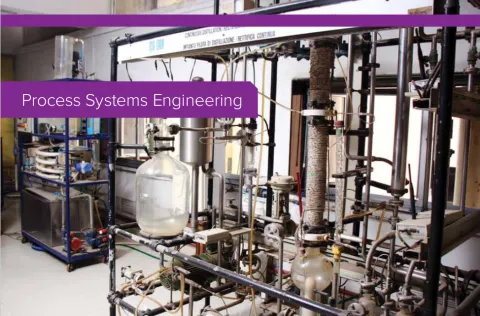Process Systems Engineering (PSE) focuses on a complete, life cycle view of the manufacturing process in chemical engineering, beginning from the scale of molecule discovery & scale up to the other end of spectrum relating to achieving manufacturing excellence and minimizing environmental impact. The PSE research has been focusing on these various individual steps in the life cycle of process engineering from both theoretical as well application perspectives. Beginning at the smallest scale of molecular modeling, research work at the department has focused on Novel multi-scale simulation techniques for simulating complex interacting systems.The molecular scale information is employed with macroscopic models to describe chemical processes at the device length scales. Attempts to exploit the predictive capabilities of these multi-scale models for optimizing aforementioned devices are also currently underway. At the larger scale, the group has been focusing on the development of a generalized reactor model framework that can accommodate the wide diversity of chemical reactors. Establishing empirical cause and effect relationships for the purposes of process development, scale-up, process optimization, advanced process control, as well as fault detection and diagnosis, has been an area of significant activity in the systems engineering group. Basic and advanced optimization has been a focus area of research in the department with several important and critical applications. Optimization for sensor network design that balances different criteria, such as process observability, precision & accuracy of parameter estimates and fault isolability, and overall cost of the sensor network has been an another active research area of the group. The group also focuses on the design of energy efficient heat exchanger networks along with approaches to identify opportunities for process intensification, i.e evolving substantially smaller, cleaner, and more energy-efficient designs. Some of key applications that are being considered are design of novel reactive separations methods for important industrial systems and design of new and alternate process routes related to green manufacturing. Basic and advanced process control approaches are deployed in chemical process manufacturing to realize the optimal targets resulting from design and/or operational optimization steps. Model predictive control (MPC) has been one of the popular model based control algorithms. The group works on multi-parametric MPC approach with special applications to fast transient systems. Biological systems exhibit several interesting phenomena at the cell level such as significantly amplified sensitivity of enzyme cascades. To develop a better understanding of these interesting phenomena, control theoretic approaches have been successfully used to represent and explain the feedback-like structures at the cell level.

